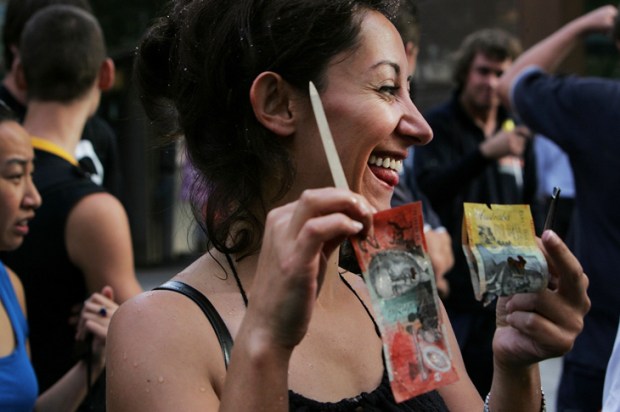In complex and chaotic times, our reliance on ‘sensemaking’ institutions is greater than ever. Media and academic institutions are at the centre of a functional society’s ability to have nuanced and complex debates on challenging or controversial issues. These sensemaking institutions are crucial to what author Jonathan Rauch calls the ‘constitution of knowledge’.
As Rauch wrote in his 2021 book of the same name, the constitution of knowledge is: ‘… liberalism’s epistemic operating system: our social rules for turning disagreement into knowledge. The system did not assemble itself by some automatic social magic; it was the product of hard-fought battles and hard-won norms and institutions, and many people suffered and bled for it along the way.’
Our sensemaking institutions are crucial in challenging viral narratives and beliefs that can grow exponentially, often fed by social media and advocacy groups. These narratives are effectively ‘confirmation loops’, which – as Rauch writes – are ‘like market bubbles, [and] can run far ahead of reality before they finally break.’
While journalists and academics move to different rhythms, both ostensively serve a crucial role in the ‘constitution of knowledge’, one that underpins civic discourse and should challenge narrative bubbles. In order to do this, their labours need to be anchored in critical inquiry and honest reporting of that inquiry.
How do we know if our sensemaking institutions are doing their job here in Australia, especially with tackling narratives that show signs of a ‘confirmation loop’?
I suggest that to answer that, we consider a rather uncontrolled but nonetheless illustrative test: pick one of the biggest issues or stories over the last few years here in Australia – one that has dominated both ‘popular’ and ‘elite’ platforms – and see how it has progressed over time now we have the benefit of reflection.
Here in Australia, one such major story – an allegedly ‘history-changing’ one – was the notion of a pre-colonial history of agriculture in Australia put forward by Bruce Pascoe in his best-selling and widely-acclaimed book Dark Emu, first published in 2014. With some few notable exceptions, the first several years of Dark Emu’s reception was a tidal wave of gushing enthusiasm, with a corresponding dearth of critical attention. From Dark Emu’s success with the NSW Premier’s Literary Award in 2016 (‘without peer in his field’ according to the judges) to Pascoe’s TEDx Sydney talk in April 2020 (‘A real history of Aboriginal Australians, the first agriculturalists’) it has been an almost unfettered ride until 2021.
Journalists and even (generally non-specialist) academics where quick to line up and bask in Dark Emu’s wake. Pascoe was given countless opportunities to restate his ‘truer history’ on our national broadcaster, flag-ship newspapers, podcasts and university public talks.
Of course, tides turn and bubbles burst, and by 2021 a curious public had available an in-depth scholarly critique from anthropologist Peter Sutton and archaeologist Keryn Walshe with their book Farmers or Hunter-Gatherers?: The Dark Emu Debate (Melbourne University Press). Being from well-credentialled scholars, the book was hard to dismiss as a right-wing attack, and it looked like it might deal a major blow to the near-ubiquitous acclaim of Pascoe’s tome. Amongst many points, Sutton and Walshe demonstrated Pascoe’s practice of omitting key passages from his primary source quotes, such that the meaning becomes unclear or even opposite to inferences (an odd trait for a ‘truth-teller’).
By then, however, Dark Emu had been held up for several years as a ‘truer’ revisionist history, was in its second edition with several reprints, added to school curricula and with a kid’s version available (Young Dark Emu, 2019, with the subtitle A truer history).
It would be fair to say cognitive dissonance did appear for a while after Sutton and Walshe’s book, their critique gaining some good initial coverage and even some very limited public acknowledgement of the misplaced haste of journalists’ uncritical acceptance of Pascoe’s thesis (Paul Barry on ABC’s Media Watch).
Of course, in a healthy society, knowledge claims change over time, and what most people might have believed five, fifty or one hundred years ago might not be the same today. So, what’s the problem: isn’t Dark Emu just another example of this?
The problem is that the kind of reasonable critique Dark Emu should have been subjected to in its initial years was absent. Where was the journalistic search for balance? Where were the actual academic historians, anthropologists, archaeologists (Ian Keen at ANU being an exception)? When and where did journalists seek expert opinions from experts on Dark Emu and its thesis? (Richard Guilliatt’s 25 May 2019 piece in the Weekend Australian Magazine being another rare exception).
If we take Dark Emu and Pascoe’s reception as a test of whether our sensemaking institutions are doing their job, then I suggest that they have clearly failed. The fact that it took until 2021 for major mainstream news outlets to give serious airtime or column inches to what was always a highly contestable set of claims is concerning, and suggests the disturbing possibility that when highly fraught moral or ‘social justice’ narratives are present, our institutions struggle to meet their obligations within a timeframe that is useful to hold the bubble in check.
Of course, nature abhors a vacuum, and in the hole left by mainstream media and academics, others rushed in to fill the gap prior to Sutton and Walshe’s book. The website Dark Emu Exposed was born, and conservative outlets and thinkers offered criticism others failed to provide, such as with Peter O’Brien’s Bitter Harvest: The Illusion of Aboriginal Agriculture in Bruce Pascoe’s Dark Emu (2019, Quadrant Books).
If Pascoe’s book proves anything, it is that without quality academic and journalistic interrogation, dubious ideas can run exponentially rampant.
Why this state of affairs? Because, I believe, we are in a time of ‘moral clarity’ where social justice underpins many narratives and progressive causes. The awkward possibility of finding counter arguments or contrary evidence to a morally led cause is too acute, combined with the threat of social media mobbing and accusations of racism are so cheaply deployed as weapons of censorship.
So, Dark Emu’s frictionless reception is a sign of a greater malaise in our sensemaking institutions; one that has potentially dire consequences for how society collectively responds to pressing social, environmental and public health challenges.
If we take a selection of the most highly polarising issues currently showing similar confirmation loop ‘bubble’ trajectories to Dark Emu, then we can see familiar dynamics working their way through with them too, such as with the current ‘gender-wars’ around the ‘affirmative treatment’ model in gender clinics for gender-questioning or non-conforming adolescents.
As with this and other pressing issues, it is our media and academic institutions that should be pressure-testing and tempering the confirmation loop that Rauch refers to. Our sensemaking institutions must stand up and be counted, for when the bubbles burst, those who have been let down will demand redress and the question asked will be: ‘Where were all the critically minded academics and journalists when the narrative bubble was growing unchecked?’.
Got something to add? Join the discussion and comment below.
Get 10 issues for just $10
Subscribe to The Spectator Australia today for the next 10 magazine issues, plus full online access, for just $10.
You might disagree with half of it, but you’ll enjoy reading all of it. Try your first month for free, then just $2 a week for the remainder of your first year.














Comments
Don't miss out
Join the conversation with other Spectator Australia readers. Subscribe to leave a comment.
SUBSCRIBEAlready a subscriber? Log in